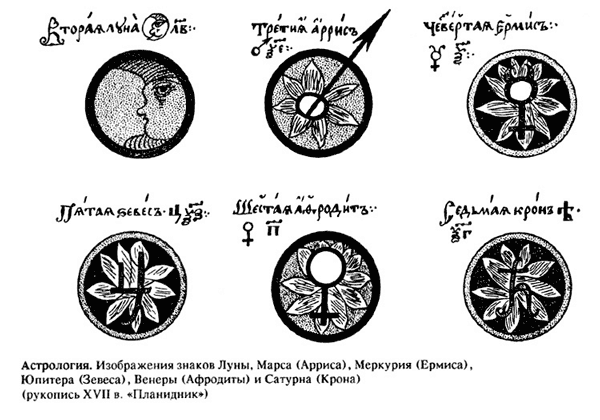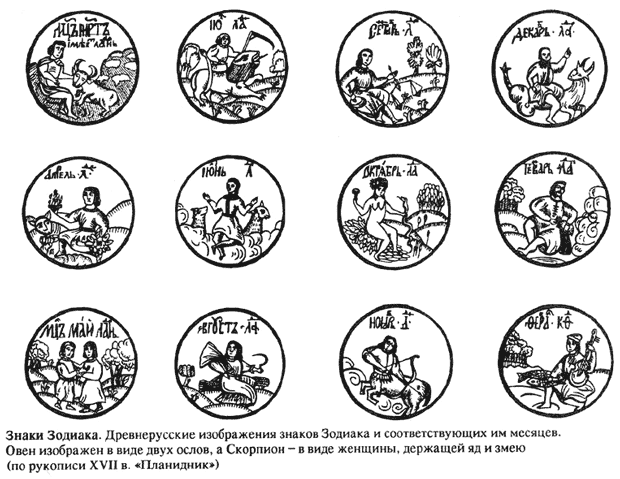

Astrology and Old Russian paganism

Since ancient times Slavic tribes owned well developed moon-sunny calendar system based on a three-year cycle, and later - on 19-year-old. As V.V.Titov considers, ancient Slavs considered time as the certain special external magic substance influencing the nature and the person in general it is favorable or adverse. The "evil" and "kind" periods of time had the most various duration: hour, day, month and whole year. The identity of Old Russian calendar astrology is, according to V.Titov, that the forecast of the favorable and adverse periods is carried out on the basis of a rigid calendar binding to natural natural cyclic processes: either lunar and tidal rhythmics (lunnik), or electric and seismic activity (molniyanik, gromnik) and also on 28-year cycles of alternation of days of the week and the leap periods (kolyadnik). Slavic-and-Russian astrology served the interests of rural community and the country yard, gave weather forecasts, the forthcoming harvest, an issue of the cattle, epidemics and an epizootics, made recommendations to the peasant according to the lunar calendar about concrete terms of landing and cleaning of vegetable and grain crops, a cattle face, etc., also the forecast of probability of approach of social disorders which reason was seen in approach of "evil" time was given.
Old Slavic calendar and astrological compositions reflect dualistic outlook of ancient Slavs, i.e. periodic fight of good against the evil in time. The basic concept of dualism as magics of time arose from natural cyclic process - alternation of day and night. The Supreme god Perun operating a light part of days, war and lightnings personified day (good). Night (angrily) was personified by Velez operating a dark part of days, lunar rhythmics, the underground and other world. From magic of time there was a magic of numbers: the account of time began with the beginning of the light part of day which is under control of Perun therefore one was considered as happy number, and the second part of days which is under the power of Velez was considered as unhappy. Therefore all odd numbers were happy, and even unhappy. Perun operated change of calendar years, change of four seasons of year, parts of the world, four winds, a horn of plenty and destiny (fate). Every first day from four seasons was devoted to him. On the nature of weather in such day the weather forecast of the forthcoming season was carried out. This custom remained and up to now: weather guess on Christmas, Eudoxia, Samson and Pokrov. If conditionally to accept that Perun operated the external temporary periods (space), then Velez operated internal biological rhythms, estimating from conception and finishing death, including an emotional state and diseases, and was represented by a huge idol with seven faces under one skull surrounded with seven swords in a sheath, and holding a sword in the right hand. Each face with the sword symbolically represented the nature of this or that day of the week, and the sword in a hand was attribute of god of death and a next world. Such is the reconstruction of astrological representations of pagan Russia given by V.Titov.

After adoption of Christianity the relation to astrology and astronomy in Russia was very alerted. In instructive manuals of Ancient Russia cautions from occupations "science stinking - chaldaic astronomy" became.
"Dreadful before God everyone loving geometry... I damn charm of those which look at a circle heavenly: to the mind the believer, easily falls into delights various; or simplicity over expectation of wisdom" - one of the Russian scribes of the readers so tutorially warns.
Thus, not only astrology, but also such natural sciences as astronomy, were perceived very hostilely. Let's tell, the Pskov monk of the 16th century Filofei objected to use of a system of heavenly spheres for definition of provisions of planets, claiming that it is impossible to give up a thought that operate planets reasonable, moving them voluntarily; therefore, it is impossible and to assume that people can be knows the movement of planets. The concepts similar to the following thought of Maximus the Greek were welcomed:
"If the sky moves and involves the movement the sun, the moon and stars to the west, then, so, spiritual writing in a false manner speaks: put the sky as a tent or the arch of the building, that is it is firm, not movably".

The church charter approved at the prince Vladimir specifies that "sorcery, damage, magics, predictions" belong to department of spiritual court; and for all these crimes burning on a fire was necessary. Though in Russia there were never solemn auto-da-fes as in Spain, but separate cases of punishment on a fire in chronicles it is mentioned. So, in 1227 in Novgorod "four magicians burned". In the Nikonovsky chronicle where this case is described, it is mentioned, by the way, that boyars interceded for magicians, but, unfortunately, the reasons of this protection are not explained. The Mongolian invasion aggravated decline of Old Russian astrological tradition.
In the western Russian lands where there were contacts with the European science and culture, astrology, obviously, was known more. So, in those educational institutions where the western system of a kvadrivium was accepted (for example, at schools of the raised type of the Polotsk principality), astrology was among the main studied disciplines.
Literature
 Естественнонаучные представления Древней
Руси: Счисление лет. Символика чисел. "Отреченные" книги. Астрология.
Минералогия./ Отв.ред. Р.А.Симонов. - М.: Наука, 1988
Естественнонаучные представления Древней
Руси: Счисление лет. Символика чисел. "Отреченные" книги. Астрология.
Минералогия./ Отв.ред. Р.А.Симонов. - М.: Наука, 1988 Святский Д.О. Очерки истории астрономии Древней Руси.//
Историко-астрономические исследования. Вып. 7 - 9. - 1961 - 1966
Святский Д.О. Очерки истории астрономии Древней Руси.//
Историко-астрономические исследования. Вып. 7 - 9. - 1961 - 1966 Титов В.В. Ложные и отреченые книги славянской и русской старины:
Тексты-первоисточники XV - XVIII вв. с прим., коммент. и частич.пер. -
М.: Гос. публ. ист. б-ка России, 1999
Титов В.В. Ложные и отреченые книги славянской и русской старины:
Тексты-первоисточники XV - XVIII вв. с прим., коммент. и частич.пер. -
М.: Гос. публ. ист. б-ка России, 1999 Славяно-русские календарно-астрологические тексты XV - XVIII вв. с
комментариями, предисловием и прогностическими таблицами./ Сост.
В.В.Титов. - М., 1991
Славяно-русские календарно-астрологические тексты XV - XVIII вв. с
комментариями, предисловием и прогностическими таблицами./ Сост.
В.В.Титов. - М., 1991 Воронцов-Вельяминов Б.А. Очерки истории астрономии в России. - М.:
Гостехиздат, 1956
Воронцов-Вельяминов Б.А. Очерки истории астрономии в России. - М.:
Гостехиздат, 1956 Левин М.Б. Отечественная астрология: этапы развития.// Астролог. -
1991. - №2-3
Левин М.Б. Отечественная астрология: этапы развития.// Астролог. -
1991. - №2-3 Д.Куталев Новая астрологическая энциклопедия
Д.Куталев Новая астрологическая энциклопедия Г.Бедненко "Древнерусская астрология"
Г.Бедненко "Древнерусская астрология"
Websites
 http://www.gumer.info/bogoslov_Buks/okkultizm/Article/dan_jaztrad.php
http://www.gumer.info/bogoslov_Buks/okkultizm/Article/dan_jaztrad.php
 http://rodon.org/rba/yads.htm
http://rodon.org/rba/yads.htm